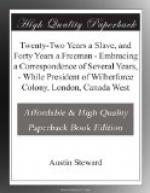I told him we were not accustomed to turn away any one on such a night; that they were welcome to come in; and they were soon seated around our large and cheerful fire.
They had laid aside their snow-shoes and knapsacks, and the heat of the fire soon made their blankets uncomfortable; but as one of them made a move to throw it off, another was heard to whisper, “wait a little; we are among strangers, you know; so do not make a display of yourself.” The fellow drew his blanket about him; but we had heard and seen enough to awaken curiosity, if not suspicion. In passing out of the room soon after, I heard one of these pretended Indians say to his companion, “I know these folks are from the States, for I smell coffee.” When they finally sat down to table, and saw silver upon it, they cast surprised and knowing glances at each other, all of which we closely observed, and were convinced, that they were not red men of the forest, but belonged to that race who had so long looked haughtily down upon the colored people; that the least exhibition of comfort, or show of refinement astonished them beyond measure.
In the meantime, my wife had whispered to me that she was sure that the principal speaker was no other than the aristocratic Mr. G——, of Canandaigua. I could not believe it; I could not recognize in that savage costume, one who had been bred in affluence, and “the star” of genteel society. But my wife soon developed the affair to our mutual satisfaction: G——, on taking from her a cup of coffee, remarked, “this looks good; and I have had no good coffee since I left my mother’s house.”
“Does your mother still reside in C——?” asked Mrs. Steward.
“My mother! my mother! what do you know of my mother!” said he, looking sharply at her; but observing that they were recognized, they began to laugh, and we had a hearty congratulation all round; while G——, starting-up from table, exclaimed,
“Come, boys, off with this disguise; we are among friends now.”
Our Indian guests, now appeared in costume more like “Broadway dandies,” than savages. Dressed in the finest cloth, with gold chains and repeaters; and all that constituted the toilet of a gentleman. After tea they requested to dry some costly furs, which they took from their knapsacks and hung around the fire. The following day they took their leave, with many apologies and explanations, regarding their appearance and conduct. They were in the wilderness, they said, trading for very valuable furs; they had money, jewelry and rich goods, which they had taken that method to conceal.
During all this time, there had been another visitor in the house, who was sitting in a corner, absorbed in writing. Our mock Indians had noticed him, and not knowing who he was, expressed a determination “to quiz that deaf old devil,” after supper. We all seated ourselves around the fire, and our Canandaigua friends, though no longer savages, had not forgotten the silent man in the corner; they began to question him, and he aroused himself for conversation; nor was it long before they forgot their design to quiz him, and found themselves charmed listeners to the brilliant conversation, of that world-renowned champion of humanity, Benjamin Lundy, for he it was.




